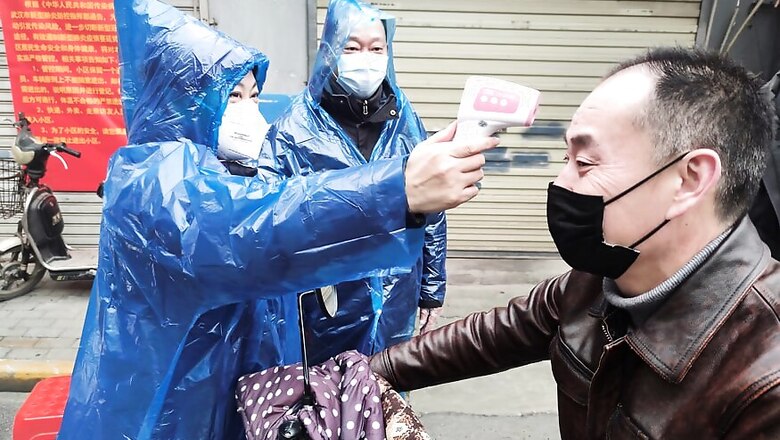
views
Seoul: A total of 82 countries and regions have imposed entry bans or quarantine procedures on visitors from South Korea to date over new coronavirus fears on Monday, despite Seoul's beefed-up diplomacy to prevent inordinate measures targeting its citizens.
The number of COVID-19 infections in South Korea has risen to 4,335 with 26 deaths, and the country is speeding up the testing process under an all-out campaign to stem the virus' spread.
New Zealand was also added to the daily tally of countries enforcing quarantine measures against Koreans. The country now puts visitors who have traveled to South Korea or northern Italy in the past two weeks under a 14-day self-quarantine.
Maldives plans to enforce an entry ban on those from South Korea's southeastern city of Daegu, seen as a cluster of infections, and other regions, starting Tuesday. But it has decided not to bar the entry of those from Seoul, a foreign ministry official said.
In China, 14 provinces and cities, including Beijing and Shanghai, have enforced strong quarantine measures against travellers from South Korea or parts of the country such as Daegu that have reported a cluster of virus infections.
The US has yet to impose any entry restrictions for South Koreans. But the State Department has raised its travel advisory for Daegu to the highest level, which urges its people not to travel, citing the level of community spread of the virus.
US President Donald Trump said Sunday that people arriving in the U.S. "from certain designated high-risk countries or areas within those countries" will be screened both before leaving the country and when arriving.
Seoul has been beefing up diplomacy to persuade countries to not enforce entry restrictions, stressing its capacity to contain the virus.
Foreign Minister Kang Kyung-wha has held a series of phone talks with her foreign counterparts or related officials to urge their countries to trust Seoul's quarantine efforts and not to take any "excessive measures."
The foreign ministry is also in talks with dozens of countries, which have banned the entry of people from South Korea, to explore ways to enable businesspeople here to travel to those countries.
Meanwhile, school breaks were again extended nationwide, until March 23, as the nation provides an "all-out response" to the fast-spreading virus that includes a massive testing programme.
So far, 26 people, mostly ones with underlying illnesses, have died here from COVID-19, which first emerged in China. Four new deaths were reported earlier in the day, including an 82-year-old man and an 87-year-old woman.
About 57 percent of confirmed cases have been linked to a branch of the Shincheonji religious sect in the southeastern city of Daegu. Most confirmed cases with unknown origins in Daegu and North Gyeongsang Province, the epicenters of the virus outbreak here, are believed to be tied to the religious group, officials said.
The total number of cases in Daegu, 300 kilometers southeast of Seoul, and its neighboring North Gyeongsang stood at 3,081 and 624, respectively.
The virus cases in Busan rose by five to 88, with 32 patients linked to a Christian church in the Dongnae district. The 32 patients of the Oncheon church in Busan are tied to the church's three-day retreat that ended on Feb. 17, officials said. It is still unclear how they were infected with the virus, reports Yonhup.
In evidence that the virus could be circulating undetected, a 25-year-old Chinese university student tested positive for the virus in Gangneung on March 1. When he arrived in South Korea from the northern Chinese city of Shenyang on Feb. 28, the Chinese student showed no symptoms, local government officials said.
To minimize deaths from the virus, KCDC Director-General Jeong Eun-kyeong told reporters that the health authorities had revised government guidelines to allow critically ill patients to be swiftly treated in so-called negative-pressure rooms at hospitals from Monday.
So far, virus patients with mild or moderate symptoms have also been allowed to receive treatment at such facilities, which are designed to prevent infectious diseases from spreading within hospitals.
Vice Health Minister Kim Gang-lip said in a daily briefing that the government opened an isolation facility in Daegu where virus patients with mild symptoms can be admitted.
About 160 patients will be admitted to the facility, Kim said, adding that two more of such facilities will be set up this week.
Since raising the virus alert level to "red," the highest level, on Feb. 23, health authorities have focused on halting the spread of the virus in Daegu, the epicenter of the virus outbreak here, and North Gyeongsang Province.
On Sunday, President Moon Jae-in said the government "is now waging an all-out response after raising the crisis alert to the highest level."




















Comments
0 comment